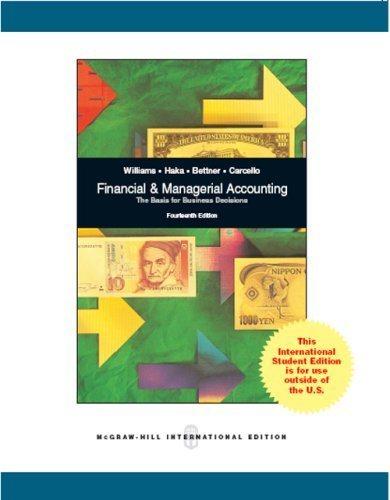Big Oaks, a large campground in Vermont, adjusts its accounts monthly and closes its accounts annually on
Question:
Big Oaks, a large campground in Vermont, adjusts its accounts monthly and closes its accounts annually on December 31. Most guests of the campground pay at the time they check out, and the amounts collected are credited to Camper Revenue. The following information is available as a source for preparing the adjusting entries at December 31:
Big Oaks invests some of its excess cash in certificates of deposit (CDs) with its local bank.
Accrued interest revenue on its CDs at December 31 is $425. None of the interest has yet been received. (Debit Interest Receivable.)
An eight-month bank loan in the amount of $12,000 had been obtained on October 1. Interest is to be computed at an annual rate of 8 percent and is payable when the loan becomes due.
Depreciation on buildings owned by the campground is based on a 20-year life. The original cost of the buildings was $720,000. The Accumulated Depreciation: Buildings account has a credit balance of $160,000 at December 31, prior to the adjusting entry process. The straight-line method of depreciation is used.
Management signed an agreement to let Girl Scouts from Easton, Connecticut, use the camp-ground in June of next year. The agreement specifies that the Girl Scouts will pay a daily rate of $15 per campsite, with a clause providing a minimum total charge of $1,200.
Salaries earned by campground employees that have not yet been paid amount to $1,515.
As of December 31, Big Oaks has earned $2,700 of revenue from current campers who will not be billed until they check out. (Debit Camper Revenue Receivable.)
Several lakefront campsites are currently being leased on a long-term basis by a group of senior citizens. Five months’ rent of $7,500 was collected in advance and credited to Unearned Camper Revenue on November 1 of the current year.
A bus to carry campers to and from town and the airport had been rented the first week of December at a daily rate of $45. At December 31, no rental payment has been made, although the campground has had use of the bus for 18 days.
Unrecorded Income Taxes Expense accrued in December amounts to $6,600. This amount will not be paid until January 15.
Instructions
a. For each of the above numbered paragraphs, prepare the necessary adjusting entry (including an explanation). If no adjusting entry is required, explain why.
b. Four types of adjusting entries are described at the beginning of the chapter. Using these descriptions, identify the type of each adjusting entry prepared in part a above.
c. Indicate the effects that each of the adjustments in part a will have on the following six total amounts in the campground’s financial statements for the month of December. Organize your answer in tabular form, using the column headings shown below. Use the letters I for increase, D for decrease, and NE for no effect. Adjusting entry 1 is provided as an example.
.png)
d. What is the amount of interest expense recognized for the entire current year on the $12,000 bank loan obtained October 1?
e. Compute the book value of the campground’s buildings to be reported in the current year’s December 31 balance sheet. (Refer to paragraph3.)
Financial StatementsFinancial statements are the standardized formats to present the financial information related to a business or an organization for its users. Financial statements contain the historical information as well as current period’s financial...
Step by Step Answer:

Financial And Managerial Accounting
ISBN: 12
14th International Edition
Authors: Jan R. Williams, Joseph V. Carcello, Mark S. Bettner, Sue Haka, Susan F. Haka





